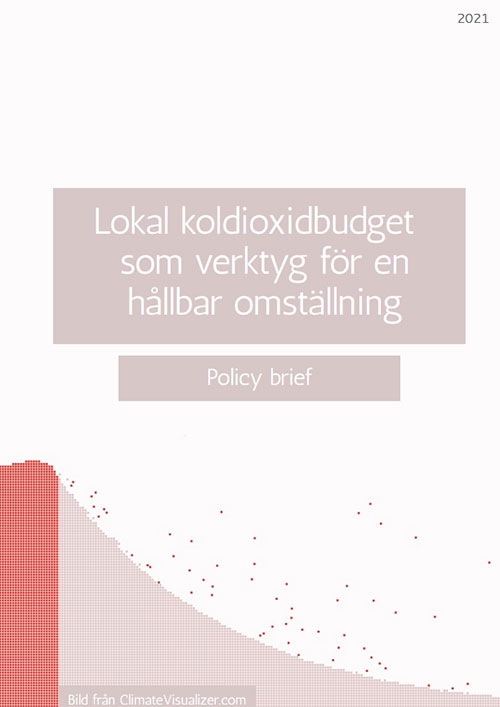
Foto: Stewen Quigley (cropped)
Welcome to CEMUS online library for student theses on sustainability and climate from all over the world!
Do you want to have your thesis and associated material (presentations, photos, videos, audio) published at this page? Please send your thesis and materials to us and we will do a review and get back to you about publishing here. If you have questions please contact Lead Outreach Coordinator, Daniel Mossberg, daniel.mossberg[a]cemus.uu.se.
Researching sustainability education through the lens of anti-oppressive pedagogy: a critical discourse analysis of the educational policies of three international high schools with sustainability foci by Aster Tommasini
As the notion of sustainability has gained prominence in the past decade, so have different disciplines that have addressed sustainability issues from an educational standpoint, for example Environmental Education and Education for Sustainable Development. Both fields have been called out for shortcomings such as omitting social considerations to sustainability issues and reproducing neoliberal framings that go hand in hand with oppressive power structures and systemic inequality. To better grasp how sustainability education is framed in relation to anti-oppressive pedagogy, this research conducted a Critical Discourse Analysis on selected materials that were publicly available on the websites of three international high schools with sustainability-oriented curricula Green School, United World Colleges, and Amala Education. From the analysis of the selected documents, the three educational organizations’ discourses of sustainability align with the narrative of Education for Sustainable Development and lack critical considerations on the
embeddedness of their sustainability education, and the larger sustainability challenge, in neoliberal framings and systems of oppression that reproduce inequality and marginalization and that constrain processes of transformation. While language that relates to the framings of anti-oppressive pedagogy was present, to different extents, in the texts of the three organizations, it was not framed in relation to sustainability, but as a separate layer of educational practice, lacking problematization on the role of sustainability education discourses in the making of anti-oppressive sustainability education, and on the critical significance of considering anti-oppressive pedagogy for the making of sustainability education.
Read more and download (pdf) »
Tommasini, A., 2021: Researching sustainability education through the lens of anti-oppressive pedagogy: a critical discourse analysis of the education policies of three international high schools with sustainability foci. Master thesis in Sustainable Development at Uppsala University, No. 2021/36, 48 pp, 30 ECTS/hp
Local Carbon Budgets as a Governance
Tool for Sustainability Transitions: A Case Study from Västra Götaland by Derek Garfield
 A growing awareness of the severity of the climate crisis caused by anthropogenic greenhouse gas emissions has led to an increased effort to find governance strategies to transition society towards sustainable development. One recently adopted strategy is the adoption of local carbon budgets, derived from the so-called global carbon budget, within local governments across Sweden. In this thesis, I explore this happening through a case study of the county of Västra Götaland, Sweden using the concept of governmentality to provide critical analysis of the use of local carbon budgets in an attempt to encourage reflexive governance. By conducting semi-structured interviews with persons involved in the adoption of local carbon budgets in Västra Götaland, I seek to gain a greater understanding of how local carbon budgets impact the way actors seek to govern climate through the adoption of new programs of conduct that seek the reform of the current regime of practices that exist within the county. I explore how such carbon budgets construct the problem of climate change and the need for rapid decarbonization to discover what practices are limited or made possible through such a construction.
A growing awareness of the severity of the climate crisis caused by anthropogenic greenhouse gas emissions has led to an increased effort to find governance strategies to transition society towards sustainable development. One recently adopted strategy is the adoption of local carbon budgets, derived from the so-called global carbon budget, within local governments across Sweden. In this thesis, I explore this happening through a case study of the county of Västra Götaland, Sweden using the concept of governmentality to provide critical analysis of the use of local carbon budgets in an attempt to encourage reflexive governance. By conducting semi-structured interviews with persons involved in the adoption of local carbon budgets in Västra Götaland, I seek to gain a greater understanding of how local carbon budgets impact the way actors seek to govern climate through the adoption of new programs of conduct that seek the reform of the current regime of practices that exist within the county. I explore how such carbon budgets construct the problem of climate change and the need for rapid decarbonization to discover what practices are limited or made possible through such a construction.
I find that local carbon budgets are problematizing several areas of municipal and regional governance, conceptually and practically, particularly in the way actors understand climate change and the decarbonization challenge. I argue that a reterritorialization of the climate into local ‘emission spaces’ allows for the quantification and distribution of limited ‘emissions resources’ amongst actors in the county. This territorialization and quantification of a constructed resource contribute to a perception of urgency critical to motivating action to decarbonize. These conditions create a mandate for political action to resolve the constructed problem of scarce ‘emissions resources’ within a municipality or county’s ‘emissions space’ to ensure a ‘fair’ distribution in society. I further suggest that actors adopting local carbon budgets should consider the application of common-pool resource management strategies to move governance beyond an internal carbon budgeting approach.
Read more and download (pdf) »
Garfield, D., 2021: Local Carbon Budgets as a Governance Tool for Sustainability Transitions: A Case Study from Västra Götaland. Master thesis in Sustainable Development at Uppsala University, No. 2021/51, 84 pp, 30 ECTS/hp
Local carbon budgets as a tool for
sustainability transitions: Three emerging narratives of change and governance by Sanna Gunnarsson
 This study takes as a starting point that climate change must be seen as interrelated with other social, technological, political, and ecological challenges of our times, and that it is closely linked to the local arena of policy and planning. By this, the study is guided by the notion that sustainability transitions are needed to combat climate change. The aim of this study is to explore if and how local carbon budgets can be a tool for municipal governance in facilitating sustainability transitions. Through an analysis of narratives of change and modes of governing, the aim is pursued by studying how the local carbon budgets developed at the Climate Change Leadership node at Uppsala University approaches a framework for transition, and how these local carbon budgets have been received by municipal planning and policy actors in two case studies: Nyköping and Järfälla municipality. The study uses a qualitative case study approach with semi-structured interviews, document analysis and participatory observation as its methods. From the results and analysis, three narratives of change emerged: Tweak the system, Re-invent the system, and Shake the system. The three narratives suggest different pathways for sustainability transitions, as well as different approaches to local governance. In conclusion, the results of this study suggest that the local carbon budgets can be several different tools for sustainability transitions, and what kind of tool it becomes is dependent on what narratives of change and approach to local governance that shapes it. Finally, the study highlights the importance of using local carbon budgets to their full potential, allowing them to question, challenge and reimage what kind of change is needed and how it can come about, if more transformative sustainability transitions are to be reached.
This study takes as a starting point that climate change must be seen as interrelated with other social, technological, political, and ecological challenges of our times, and that it is closely linked to the local arena of policy and planning. By this, the study is guided by the notion that sustainability transitions are needed to combat climate change. The aim of this study is to explore if and how local carbon budgets can be a tool for municipal governance in facilitating sustainability transitions. Through an analysis of narratives of change and modes of governing, the aim is pursued by studying how the local carbon budgets developed at the Climate Change Leadership node at Uppsala University approaches a framework for transition, and how these local carbon budgets have been received by municipal planning and policy actors in two case studies: Nyköping and Järfälla municipality. The study uses a qualitative case study approach with semi-structured interviews, document analysis and participatory observation as its methods. From the results and analysis, three narratives of change emerged: Tweak the system, Re-invent the system, and Shake the system. The three narratives suggest different pathways for sustainability transitions, as well as different approaches to local governance. In conclusion, the results of this study suggest that the local carbon budgets can be several different tools for sustainability transitions, and what kind of tool it becomes is dependent on what narratives of change and approach to local governance that shapes it. Finally, the study highlights the importance of using local carbon budgets to their full potential, allowing them to question, challenge and reimage what kind of change is needed and how it can come about, if more transformative sustainability transitions are to be reached.
Read more and download (pdf) »
Gunnarsson, S., 2021: Local carbon budgets as a tool for sustainability transitions: Three emerging narratives of change and governance. Degree project in the Built Environment, Second cycle, KTH Royal Institute of Technology, School of Architecture and the Built Environment
Lokal koldioxidbudget för en hållbar omställning: Policy brief av Sanna Gunnarsson
En policy brief om lokala koldioxidbudgetars potential som verktyg för en hållbar omställning. Baserad på ett mastersarbete vid KTH Stockholm.
The Present and the Future of Fare-Free Public Transport and Sustainable Public Transport: The Cases of Avesta and Tallinn and The Visions for Luxembourg and Uppsala by André Dutra
 This research intends to illuminate the concept and application of the public policy named fare -free public transport (FFPT), using the cases of Avesta and Tallinn and analysing future applicability of it in the cases of Luxembourg and Uppsala city. The analysis explores the fare-free public transport policy and the theory of sustainable transport. The study presents the different benefits of the policy and its limitations, and how the FFPT is connected to sustainable transport and sustainable development theories and application. Through a case study analysis based in literature review, the analysis of both cities wants to elucidate the application of the FFPT as one important policy tool within cities both for the environment and for the people, and how the policy can develop in the future. Considering this, the presented research also opens the possibility of expansion of the policy to other cities and countries.
This research intends to illuminate the concept and application of the public policy named fare -free public transport (FFPT), using the cases of Avesta and Tallinn and analysing future applicability of it in the cases of Luxembourg and Uppsala city. The analysis explores the fare-free public transport policy and the theory of sustainable transport. The study presents the different benefits of the policy and its limitations, and how the FFPT is connected to sustainable transport and sustainable development theories and application. Through a case study analysis based in literature review, the analysis of both cities wants to elucidate the application of the FFPT as one important policy tool within cities both for the environment and for the people, and how the policy can develop in the future. Considering this, the presented research also opens the possibility of expansion of the policy to other cities and countries.
Read more and download (pdf) »
Dutra, A., 2019: The Present and the Future of Fare-Free Public Transport and Sustainable Public Transport: The Cases of Avesta and Tallinn and The Visions for Luxembourg and Uppsala. Master thesis in Sustainable Development at Uppsala University, No. 2019/59, 64 pp, 30 ECTS/hp
Belo Monte Dam: drowning gods for development by André Dutra
 In 2010 the Brazilian Federal Government started the construction of which was planned to be the third biggest hydroelectric power plant in the world, Belo Monte, in the cities of Altamira, Vitória do Xingu and Senador José Porfírio, in the Amazon rainforest, the state of Pará, Brazil. This enterprise was very controversial because of the displacement of local communities and indigenous villages, as well as the great environmental impact on the Amazon rainforest. This work intends to analyze the historical process involving the studies to measure the hydroelectric potential of the Xingu River Basin and to assess the decision-making process that led the Brazilian Government to continue implementing this enterprise despite the social outcry and the heavy reaction against it from the impacted communities, the social movements, the scientific community and other actors, but specially taking in consideration the struggle of the native communities, also called indigenous peoples.
In 2010 the Brazilian Federal Government started the construction of which was planned to be the third biggest hydroelectric power plant in the world, Belo Monte, in the cities of Altamira, Vitória do Xingu and Senador José Porfírio, in the Amazon rainforest, the state of Pará, Brazil. This enterprise was very controversial because of the displacement of local communities and indigenous villages, as well as the great environmental impact on the Amazon rainforest. This work intends to analyze the historical process involving the studies to measure the hydroelectric potential of the Xingu River Basin and to assess the decision-making process that led the Brazilian Government to continue implementing this enterprise despite the social outcry and the heavy reaction against it from the impacted communities, the social movements, the scientific community and other actors, but specially taking in consideration the struggle of the native communities, also called indigenous peoples.

